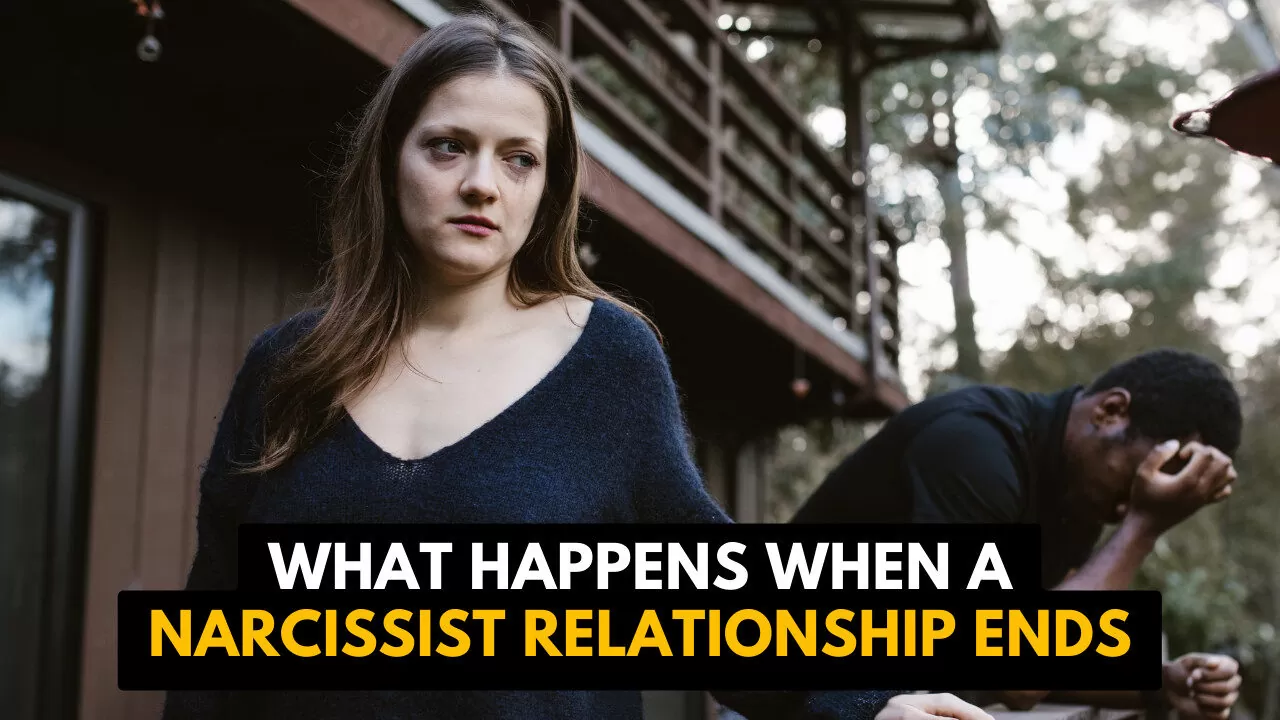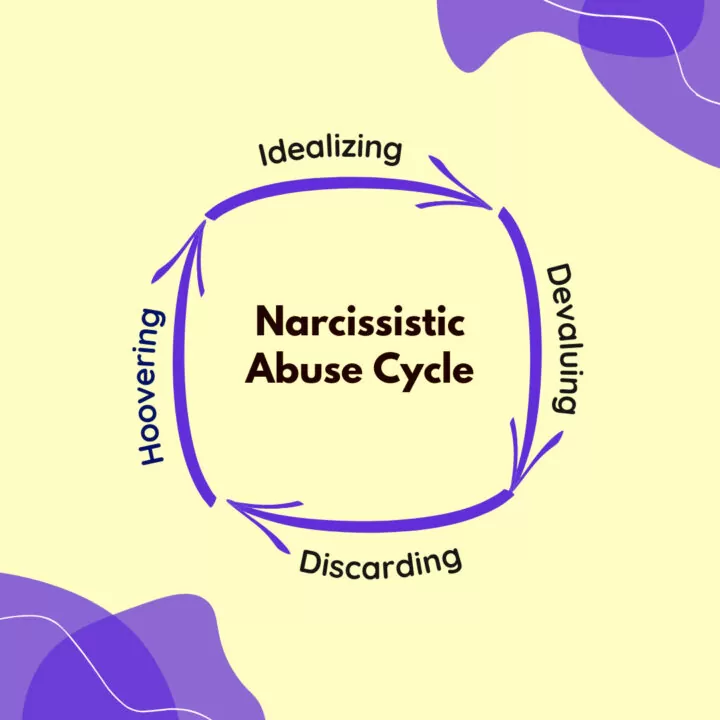We know that narcissists act out of anger when their ego is bruised. What else happens at the end of a narcissistic relationship?
Narcissists may behave in one of two major ways at the end of a narcissistic relationship:
- They would feel bad and react in unnatural ways, like love-bombing and shouting, if you broke up with the narcissist.
- They would move on like nothing happened, and plot ways to malign your character, if the narcissist ended the relationship suddenly.
Narcissists are damaged people who have a conscious sense of superiority while also having an unconscious sense of inadequacy.
Find out how to leave a narcissist, even if you have no money, and be free.

What happens to a narcissist at the end of a narcissistic relationship?
Research makes it pretty clear that narcissists behave aggressively when they receive a blow to their ego. The overt narcissists do it openly, while the covert ones do it in their fantasies.
Narcissism runs in the family, and research suggests a genetic component (45 to 80 percent) to narcissism.
So, what happens to a narcissist at the end of a relationship repeats a lot like how their narcissistic parents felt when the child failed at meeting their expectations.
When you dump a narcissist, it’s a slap on their self-esteem and a theft of their narcissistic supply.
In a way, narcissism develops as a defense mechanism to protect the child from the over-critical and over-expecting parent. Ignoring a narcissist reopens the old wounds of the inner child.
Narcissists are like giant soap bubbles — glorious from a distance, but fragile on close inspection.
A breakup bursts their fantasy world.
Breakups make them feel ignored and invalidated, which creates an emergency to repair their ego. And the only way they know to cope with their hurt ego is to try and gain control over you.
To re-establish their influence over you, they react in immature but brutal ways.
A review of 25 studies on the relationship between narcissism and violence found a strong association between narcissism and aggression after an ego threat among student sample populations (Lambe & Hamilton-Giachritsis, 2018).
The opposite of love is not hate, but indifference.
However, in the end, your attitude of indifference will make them feel belittled and insignificant. It will make them realize that their self-worth gets eroded every time they approach you, and you ignore them.
Eventually, their interest in you will wane, and they will stop bothering you.
What happens when you’re indifferent to the narcissistic relationship ending?
When you ignore a narcissist and show them that you don’t care about them anymore, they would want to get you back into their life. For this, they may:
- bait you
- stalk you
- lash out at you
- gaslight you
- stonewall you
- love-bomb you
- make you feel guilty
- run smear campaigns
- fake kindness and care
- fake-admit their mistakes
- send you angry messages
- create rifts with your family and friends
Narcissism exists on a spectrum, meaning that some of them are much too narcissistic while others are relatively milder. They all do not react in the same way, but there is a common thread.
A relationship with a narcissist is like a collision between love and selfishness. Your love and their love are both for them.
All those behaviors that are aimed at returning you into the relationship are part of the narcissistic abuse cycle, specifically hoovering.

How to deal with a narcissist’s reaction to your ignoring them?
The expert prescribed way to respond to an ignored (“spurred”) narcissist is to go ‘No Contact.’
Here’s how you employ the ‘No Contact’ strategy:
- Block them on your emails, messengers, phonebook, and social media.
- Inform your common friends and colleagues that you have broken up with them.
- Avoid places they are likely to visit and places you have visited with them frequently.
- Involve the legal authorities if they stalk you, threaten you, or you feel threatened in any way.
If you have successfully maintained ‘No Contact’ with them for a few months, most likely they will lose their interest in you and find a new source of narcissistic supply.
At this point, please do not go out of the way to tell the new person in the narcissist’s life about what they did to you. It could be an act fraught with grave danger.
You were their narcissistic supply.
Narcissists feel injured when you end your relationship – because you are taking away their narcissistic supply.
“Narcissistic supply” is the attention and admiration a narcissist needs from others to feel good about themselves.
A narcissist’s inner voice tells them that others don’t think they’re great and that the world is conspiring to fail them. So, they crave a validating voice that would constantly assure them of how great they are.
This validating, praising voice is their supply.
“One dose of Narcissistic Supply is enough to elevate the narcissists from the depth of misery to the heights of manic euphoria.”
— Sam Vaknin, Depression and Narcissistic Pathologies of the Self, 2021
Narcissists don’t like themselves much. They criticize their own actions, detest their selfish intentions, and dislike their low self-esteem. What salvages them from this deep distress is their narcissistic supply.
Worse, they hate their addiction to narcissistic supply.
A narcissist ending a relationship indicates that they have already found a new narcissistic supply that is better than you.
If the narcissist has not found another source of narcissistic supply, they may experience what is known as a “narcissistic collapse.”
What is narcissistic collapse?
Narcissistic collapse is a psychological and physiological state of social withdrawal and self-isolation. It may occur after a breakup; it is more frequent with covert narcissists.
Narcissistic collapse manifests as a massive mental breakdown, followed by withdrawal and isolation.
It renders narcissists unable to confront themselves and, as a result, face the world. It is usually irreversible and the narcissist may never recover from it unless help from a mental health professional.
What to say to a narcissist to shut them down?
If you want to shut down a narcissist, be clear about your expectations of them. Do not keep the narcissist guessing whether you are no longer interested in them.
A narcissist usually responds well to explicit instructions. Tell them clearly you’ve broken up with them and ask them politely not to contact you again.
Don’t do it the ambiguous way, as:
“Take some time off. I need some space to sort out things. Till I ask you again, consider it’s over.”
A crystal-clear way is to say:
“Stop contacting me. It’s over.”
A creative way to respond to a narcissist to shut them down comes from Eric Barker, author of Plays Well with Others: The Surprising Science Behind Why Everything You Know About Relationships Is (Mostly) Wrong:
“Please cancel my subscription to your issues.”
If we could add to it, it would be:
“Please cancel my subscription to your issues with immediate effect. I am going to be away and won’t need them anymore. It’s over.”

How do you win with a narcissist?
You cannot win with a narcissist, ever. The best way to handle them is to simply walk away from the game.
If that’s not possible, like with an office narcissist, then the right way is to establish strict boundaries with them.
Engage others to make them aware of the ways the narcissist may encroach on your personal space.
Do not emotionally react to their triggering behaviors. Instead, make it clear that you have a strictly transactional relationship with them.
When you yell at a narcissist for not doing things they should have done, you just tell them how to manipulate you better.
Even therapists, who are not experts in dealing with NPD, may fail to win them over to complete the treatment.
Some narcissists are so good at narcissism that they can manipulate their therapists.
Using a well-documented tactic called “counter-transference,” the NPD patient may emotionally entangle their therapist to respond in ways that they want (Diamond & Clarkin, 2014).
Note that NPD (narcissistic personality disorder) is a clinically diagnosed condition. Without a diagnosis, you cannot say for certain that a narcissistic person has NPD.
All NPDs are narcissists, but not all narcissists are NPDs.
Often, narcissists get worse with treatment.
However, there are two research-backed ways you may (or may not) help you win over a narcissist:
1. Share a point of similarity.
Researchers from the University of Michigan found that when participants shared a key similarity with the narcissistic partner, narcissistic aggression was completely minimized, even under ego threat. (Konrath & Bushman, 2006).
They suggested that when you shared a similarity, the narcissist saw you as more of an extension of themselves. So, since they love themselves so blindly, how can they hurt you?
2. Warn them about public criticism.
Narcissists are careful to maintain their good reputation, and it will prevent them from targeting you.
Narcissists crave empathy and social desirability (Watson & Morris, 1991).
Warn them with, “What will people think of you if you do that?”
To find out if someone you know might be a narcissist, check out the 20 Signs of A Narcissist.
FAQs
What is the average length of a relationship with a narcissist?
Anecdotally, narcissists’ relationships last for 2 to 4 years before they leave, or are left. However, they may stay longer if their partner is not aware of their condition and does not confront them about it.
The typical duration of 2 to 4 years may not be strictly followed because, while narcissists are masters of manipulation, the other person in the relationship may not have a matching tolerance threshold.
For example, some cultures are more tolerant of male chauvinism and male narcissism. There are also other factors that come into play, like the type of narcissist, the financial status of the relationship, and the social support of the victim.
Can a narcissist love their wife (or husband)?
A narcissist can love their spouse. However, they do it in a way that is different from what is considered to be the norm. They do not show their love through actions or words, but instead, they show it through admiration and praise.
The narcissist may seem loving when they tell their spouse how beautiful or handsome they are, but this is just to make themselves feel good about their choices.
How do you break a narcissist’s heart?
Don’t try to break a narcissist’s heart. They can come at you with a reaction that is pure evil. The right way to deal with a narcissist who broke up with you is to make a clean break with them, to never even allow them another chance to get in touch with you (‘No Contact’).
Does a narcissist regret losing you?
A narcissist’s relationships are always about them and their needs. When a relationship ends, they usually do not regret losing you. They also do not go through the grieving process to move on.
Grieving is an important part of the healing process, as it helps with closure and acceptance, which are not needed by a narcissist who lost you. Their main concerns are how to get you back and how to stop you from exposing your dark side to others.
Related Reading:
- How do narcissists react when they can’t control you?
- Why do some experts feel narcissism is a defense mechanism?
- What are some filthy ways narcissists treat their ex, and how to handle it?
Final Words
You cannot fix a narcissist, so do not try. They would cause you serious harm if you tried to repair or salvage them.
They suffer from higher rates of depression, anxiety, envy and jealousy, perfectionism, relationship difficulties, and suicidal thoughts. Those are serious issues that you would not want to trigger into an acute phase.
Let a mental health professional treat them into becoming better humans.
Specialized therapists know how to train narcissists to replace their selfish acts with altruistic ones, apathy with kindness and empathy, and self-castigation with self-compassion.
Find out how to gray rock a narcissist.
• • •
Author Bio: Researched and reviewed by Dr. Sandip Roy. His expertise is in mental well-being, positive psychology, narcissism, and Stoic philosophy.
√ If you liked it, please spread the word.